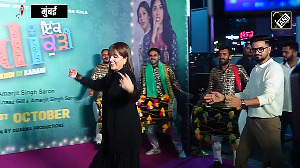Amir Bhai is a worried man.
The middle-aged man with salt and pepper hair and a neatly trimmed beard runs a tannery near Posta Bazaar in Dhaka. He is also a partner in an export firm, partly funded by a Korean firm, which makes leather items like wallets, belts and bags.
Business is good. But the future looks uncertain. Rumours of a crackdown on cattle smuggling in neighbouring India have not gone down well in Bangladesh. The dapper businessman's glasses glint as he frets over whether reports of a major project to stem the flow of cattle into Bangladesh are true.
Because every third head of cattle in Bangladesh is smuggled in from India.
Many come from as far away as Haryana and Punjab. An estimated 20,000 to 25,000 animals enter Bangladesh almost everyday through West Bengal alone. While the trade is illegal on the Indian side, it becomes legal the moment the livestock enters Bangladesh.
Bangladesh: The new terror frontier?
Some estimates put the annual turnover from leather, meat and meat exports from smuggled Indian cattle in Bangladesh at over Rs 25 billion (more than half a billion dollars).
 Months after achieving independence in late 1971, Bangladesh's first prime minister Mujibur Rehman urged his countrymen: 'drink milk, don't eat cattle'.
Months after achieving independence in late 1971, Bangladesh's first prime minister Mujibur Rehman urged his countrymen: 'drink milk, don't eat cattle'.
Image: Bangladeshi cattle dealers transport cows for slaughter ahead of the Eid ul-Adha festival.
This was because in the 10 violent months preceding independence, the marauding Pakistani Army and its local militias in what was then East Pakistan had indulged in mass-scale slaughter of the country's livestock -- eating most of it.
Consequently, Mujib found that huge tracts of arable land in the newborn nation could not be cultivated due to the lack of draught cattle.
The poor quality of the surviving livestock, the prevalence of disease and lack of veterinary services hit efforts to develop the domestic population. Neighbouring India, which had perhaps the largest cattle population in the world, had laws against the export of young, healthy cows. 
Smuggling was an easy answer to the problem.
As Bangladesh's population increased, so did the demand for cattle. There were huge spikes in demand immediately after the monsoons, which claimed thousands of animals across the nation, and just before the Eid festival, when animals are traditionally slaughtered.
Image: A Bangladeshi man returns home from a cattle market.
Indian officials, while aware of the situation, preferred to ignore it until the late 1980s, when New Delhi ordered a crackdown on smuggling to indicate its displeasure with the military regime of Hossain Mohammad Ershad, who stepped down following massive public protests in late 1990.
In 1991, newly elected prime minister Khaleda Zia, realising that the Indian crackdown on cattle smuggling was impacting heavily on domestic beef and leather prices, decided to set up a dozen customs corridors along the border with West Bengal.
These posts, which started operations from 1994, essentially legalised smuggling and also became a major revenue earner for the government.
Under this system, the smugglers take their cattle to the customs posts and declare them as 'seized' cattle of unknown origin. After paying a 'fine' ranging from Rs 500 to Rs 700 per animal (depending on the size), they collect the cattle which are then mostly sent to the slaughterhouse.
Of course, many other animals are simply transferred across the border with the connivance of the Border Security Force in India and the Bangladesh Rifles, who are paid a small sum per head, it is alleged.
Thanks to the 'arrangement' -- which still continues -- beef prices stabilised and leather exports from Bangladesh went up dramatically during this period.
Then there are the weekly cattle fairs held conveniently near the border, where animals from across the country are sold. The smugglers, both Indian and Bangladeshi, simply pay for their herd, and send the animals across in small batches.
The fencing of the border started by the National Democratic Alliance government in the late 1990s sparked serious concerns among the cattle traders as well as government circles in Bangladesh. Stoppage of the supply from India would lead to a price hike of the staple meat in Bangladesh, and hit the booming leather industry badly.
"In case the import is stopped, the price of beef here could double from the present Taka 120 [about Rs 80] per kg," asserts Mohammad Alam, a Bangladesh customs official who declines to give his designation since he is "not the official spokesperson".
"Most of the firing and other clashes along the border are over cattle smuggling," he adds. "Frankly, both the BSF and the Bangladesh Rifles have too much at stake here, and they both believe the other side as well as the smugglers are trying to undercut them."
According to him, villages like Lohapur in Birbhum district and Chuapur Haat in Murshidabad district of West Bengal and some districts of Bihar are major transit points. At Lohapur, there are even night shelters for the animals, including camels from Rajasthan, at rates which range from Rs 20 to 25 per animal per night, he claims.
These rates go up dramatically just before Eid, when the volume of Bangladesh's 'imports' of Indian cows nearly trebles, he says. Another source for smugglers are the weekly 'cattle fairs' in West Bengal and Bihar.
Contending that the cattle mafia in India is exploiting the system, he says while Hindus will not "kill the holy cow, they have no qualms about making money by letting others kill them."
He also claimed that many smugglers injure and cripple the cattle they buy so they can be certified as unfit for milch and agricultural purposes. "They are then killed and their flesh sold at premium rates."
"We have export licences for cattle," says Indian High Commissioner to Bangladesh Veena Sikri. "But to my knowledge, not one of them has been picked up."
What stops India from setting up customs points along the border, and earning revenue from the export of cattle?
Entrenched interests and sensitivity of the issue, says an Indian official.
"For one, both the BSF and the BDR and even local politicians on both sides earn a reasonably large sum from the illegal smuggling. And two, anyone who does try to export it legally faces the possibility of being attacked by the Hindu right wing in India. Why do you think people are afraid to take the export licences? No one wants to be officially identified as someone who exports cattle for slaughter in Bangladesh," the official points out.
"Besides, the export licences only apply to buffaloes, and not milch cows. And there is a huge demand for that too in Bangladesh.
Why India is concerned about Bangladesh
"The fact remains that it's not just the local smugglers and border forces making money. There is a massive cattle mafia which stretches all the way across to Haryana and other places, where cow slaughter is illegal. Most of the cattle are sent to West Bengal by train, where buffalo slaughter is legal, but the numbers far exceed the demand in that state. Besides, each animal fetches between Rs 1,000 and 1200 -- depending on the size -- more in Bangladesh than it does in India."
Discussing the issue with journalists in New Delhi on September 17 last year, BJP member of Parliament and animal rights activist Maneka Gandhi accused Railway Minister Lalu Prasad Yadav of being bribed by the cattle smugglers to lift the ban on transport of cattle.
As many as 300 animals are stuffed into each railway wagon, violating the law which allows only 10, she said. All these trains are bound for Howrah, the main station for Kolkata. Most of the animals die due to the cramped conditions, and are sold to leather and meat dealers in Kolkata.
"The Howrah Cattle Dealer Association in Howrah runs the illegal trade by bringing lakhs of cows, buffaloes, bullocks and bulls from northern states like Punjab, Haryana to West Bengal where these animals are slaughtered or smuggled to Bangladesh," she said. "Bangladesh has thin cattle population of its own, but its exports of beef runs into lakhs of tonnes."
"For Bangladesh, an Indian cow is very valuable. It gives meat, fertiliser, leather and other products," says BSF Director General R S Mooshahary.
But Amir Bhai is not interested in the politics and other issues that dog the case.
"You sell, we buy. What could be simpler than that?" he asks.
Photograph: AFP/Getty Images





